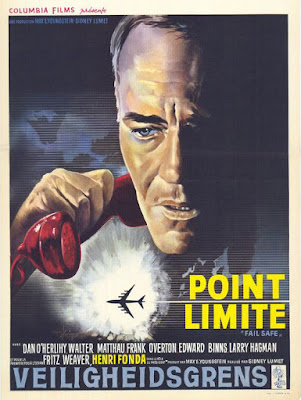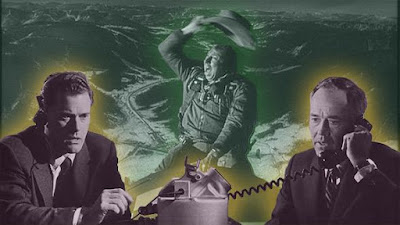 ‘The Criterion Collection’ have recently released a digitally enhanced version of ‘Fail-Safe’. It was directed by Sidney Lumet; it starred Walter Matthau, Henry Fonda, Dan O’Herlihy, Edward Binns, and Larry Hagman; and it lasts for 112-minutes. Plus, as an extra added bonus, the Blu-ray edition comes with a short documentary about the film, an interview with the film critic, J. Hoberman, as well as audio commentary narrated by Lumet. Please enjoy.
‘The Criterion Collection’ have recently released a digitally enhanced version of ‘Fail-Safe’. It was directed by Sidney Lumet; it starred Walter Matthau, Henry Fonda, Dan O’Herlihy, Edward Binns, and Larry Hagman; and it lasts for 112-minutes. Plus, as an extra added bonus, the Blu-ray edition comes with a short documentary about the film, an interview with the film critic, J. Hoberman, as well as audio commentary narrated by Lumet. Please enjoy.Fail-Safe (The Criterion Collection)
THE STORY:
Hello, Mr. President (Henry Fonda). I do apologize for interrupting your day, sir, but I’m afraid we require your services due to a major problem our military is currently facing.
You see, not so long ago, we ordered a squadron of bombers to investigate an unidentified object that was flying over our country. However, once they identified it -- namely, a civilian airliner -- a sudden technical hitch caused a serious breakdown in our line of communication. In fact, it’s so serious, our bombers failed to acknowledge instructions to return home, in favor of flying towards Moscow and dropping a bomb on the city. Or to be more specific about it, a nuclear bomb.
So, Mr. President, what should we do next? Should we send instructions to shoot them down before they can cause any damage? Should we inform the Russian Premier about this impending disaster? Or should we completely ignore the situation and hope for the best? Well, whatever you decide, that’s most probably why what next transpires goes, boom-boom-boom, when I say to myself, ‘General Bogan (Frank Overton)? We’re screwed’. As a tense conversation is full of dread - an army of soldiers are put to bed - a dangerous situation comes to a head - and at the end of the day, please remember, are we really better off being dead than red?
THE REVIEW:
In the early sixties, Stanley Kubrick filed a lawsuit against the makers of this film, ‘Fail-Safe’, because he thought it was fairly similar to a film he was making at the time, ’Dr. Strangelove’, which was based on a novel written by Peter George called ’Red Alert’. But when ‘Columbia Pictures’ caught wind of this, they decided to step in and settle this case out of court by purchasing the rights to strategically release both films. In the same year, no less, 1964, with ‘Strangelove’ coming out at the start of the year while this one came out at the end of it. Although, to be fair, I think things would’ve turned out a lot better for everyone involved if they were released in the reverse order.
You see, from a narrative point of view, Kubrick and his team were right about these films sharing a similar storyline, a very similar storyline, with a similar cast of characters and a similar overall plot. After all, they both feature an earnest president (Henry Fonda / Merkin Muffley), a sinister advisor (Doctor Groeteschele / Doctor Strangelove), a gung-ho pilot (Colonel Grady / Major Kong), and a cast of military personnel that range from the stoic (General Bogan / General Turgidson) to the unhinged (Colonel Cascio / General Ripper). What's more, both films also share a similar way of establishing their initial pretext (slow and episodic) and escalating their level of threat (minor to major), doing so while smartly defining certain technical terms so the audience can understand things more easily (such as 'War Room', which is a place that doesn’t exist in real life).
Having said that, though, the one thing they don't have in common is that ‘Strangelove’ is a satire while ‘Fail-Safe’ is a very intense melodrama. In fact, it’s so intense, that sometimes it's hard to take very seriously, especially if you’ve watched Kubrick’s comedy beforehand. In this film, for instance, a large part of the plot was focused on a very serious conversation between the President of the United States and the Russian Premier in order to negotiate what they need to do to prevent a nuclear disaster. ‘Strangelove’, on the other hand, illustrated a fairly similar sequence! But in their case, the Premier was drunk, lonely, and listening to music, while the President was suffering from a cold that causes him to sniffle. So, if you watch ‘Strangelove’ first and ‘Fail-Safe’ second, then there’s a good chance that the former will impede your enjoyment of the latter, but only because it’s satirical tone overrides everything that’s intended to be sober and somber. In many ways, it would be like watching Austin Powers before watching a James Bond movie. Or at the very least, a 'film parody' performed in a 'sketch show' prior to checking out the film in question.
That said, however, if you haven’t watched ‘Strangelove’ first, or alternatively, have a very bad memory, then I’m sure you might enjoy this film because it’s nicely constructed, very dramatic, and appropriately decorated with a claustrophobic style, comprising of tight close-up shots, atmospheric lighting, and sixties sets and attire that seem one part glamorous and one part monochromatic.
This film also tries its best to make a bold statement about the follies of relying on technology to handle our everyday affairs. Well, let’s face it, electronic paraphernalia can be like a double-edged sword. On the one hand, computers can be fairly constructive in most forms of application. While on the other, they can cause society to become subservient to an electronic-system nobody truly knows or understands. I mean, do you know how Google works? Or what your smartphone is doing when you’re not using it? Because not many people do! And that, my friends, is the point this film was trying to make: For us to not allow technology to govern our lives and control our defenses.
Anyway, that’s enough of that for the time being, because I think now would be a pretty good time for us to sit back, relax, and check out the following filmic facts: (1) ‘Columbia’ first screened this production at the ‘New York Film Festival’ on the exact same day ‘The Sun’ newspaper was first published in the UK. It was on the 15th of September, 1964. (2) This film was based on a book of the same name written in 1962 by Eugene Burdick and Harvey Wheeler. (3) Loosely translated, this project was entitled ‘In the Shadow of a Bomb’ in Finland, ‘Flight to the Unknown’ in Japan, and ‘Security System’ in Lithuania. (4) The majority of this movie was shot inside ‘Fox Studios’, located at 54th Street and 10th Avenue, New York City, as well as in and around Roosevelt Field, Westbury, Long Island. (5) One of the taglines used to promote this picture, states, ‘It will have you sitting on the brink of eternity!’. (6) All of the computer-generated images featured on the ‘control-room screen’ [including the map of the world] were drawn and animated by hand. (7) The large, metal phone used by the President to speak to the Russian Premier was actually a special phone used by explosives companies whenever they blasted a site.
In closing my review of ‘Fail-Safe’, I’m now going to rank each key performance in order of preference. So, at the top of my list, I‘m going to select the stars of the show, Henry Fonda and Larry Hagman, because the two of them worked together surprisingly well during those scenes where they had to negotiate with the Russian Premier via phone. Not only was Henry very presidential by playing the Commander-in-chief as an honest, earnest, and relatable dignitary, but in addition to this, Larry supported Henry’s role by depicting Buck as a trusted subordinate, both on a personal and professional level. Up next, I’d like to single out Frank Overton for his portrayal of General Bogan and Walter Matthau for his depiction of Doctor Groeteschele. Although, in their case, both actors tried to represent a different side of the same coin: With Frank playing the General in a similar fashion Larry did with Buck (both supportive and personable), while Walter, on the other hand, represented the dark side of the equation. A dark, sinister side, which was coldly logical and dislikeable to a fault. And as for the rest of the cast? Yeah, they were all pretty good as well: With a notable mention going out to Dan O’Herlihy, for playing General Black with a down to earth edge; Edward Binns, for playing Colonel Grady with a gruff determination; and Fritz Weaver, for playing Colonel Cascio with a tortured soul.
Actually, while I’m on the topic of torture, this point brings me quite nicely onto something else this film cleverly alludes to. Namely, who should we believe during a time of crisis? Should we believe the scientists? Even though sometimes their logic can supersede their common sense! Should we believe the psychologists? Despite the fact that emotion can get in the way of a problem-solving exercise! Or should we believe those in a position of power? Keeping in mind that we may not always agree with them, regardless of what side of the political spectrum we all reside on. Either way, no matter what we may think, we still have to come to the realization that nature and technology should work together, hand-in-hand, without one impeding the evolutionary progression of the other.
Anyway, all that aside, and I would just like to say that on the whole this is a wonderful film, and I would highly recommend it to those people who are fans of Cold War dramas and political parables.
THE RATING: A
FAIL-SAFE (1964)
 Reviewed by David Andrews
on
February 04, 2020
Rating:
Reviewed by David Andrews
on
February 04, 2020
Rating:
 Reviewed by David Andrews
on
February 04, 2020
Rating:
Reviewed by David Andrews
on
February 04, 2020
Rating:












No comments: